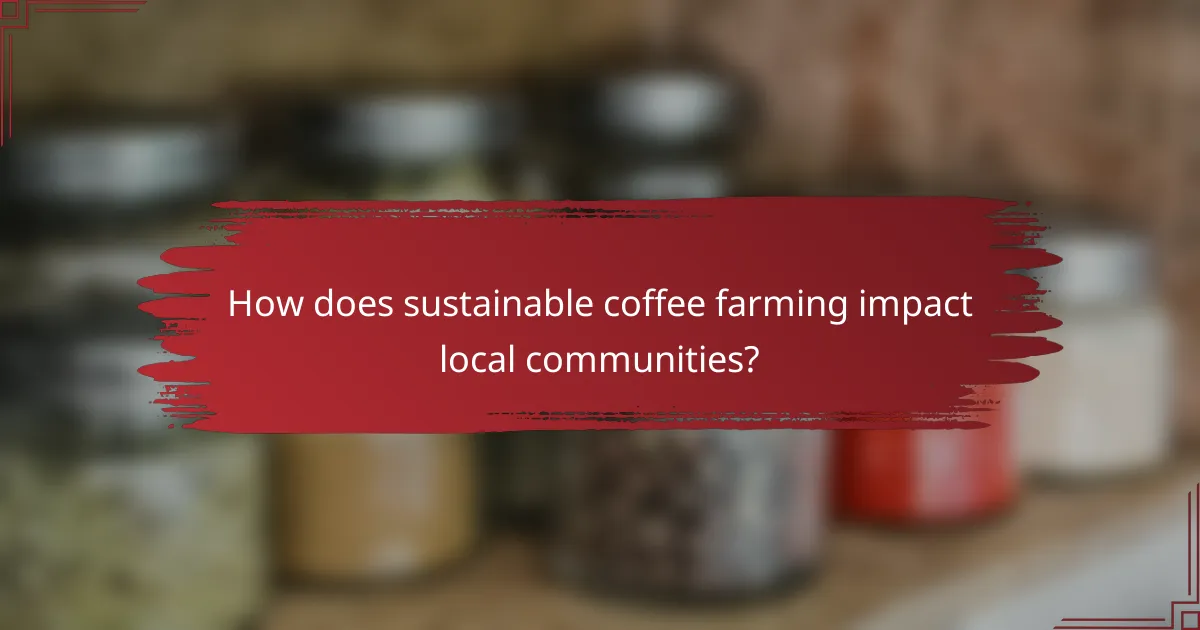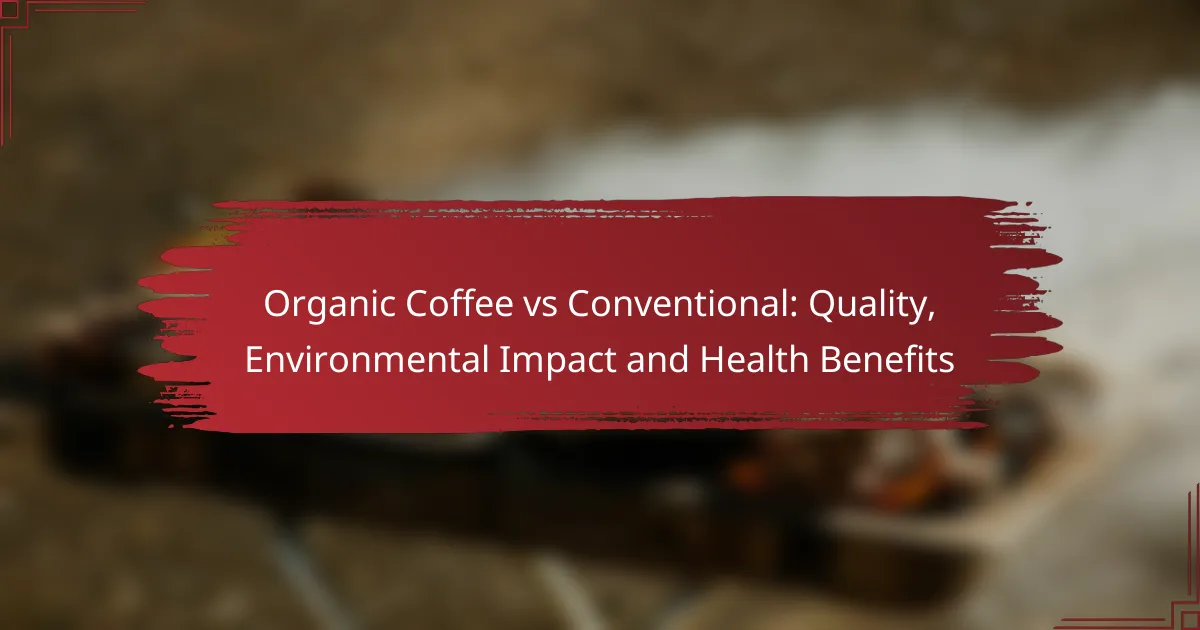Sustainable coffee farming integrates environmentally friendly practices that benefit both the ecosystem and local communities. By employing techniques such as agroforestry and organic farming, coffee producers can enhance the quality of their crops while promoting economic stability and social cohesion. This approach not only protects the environment but also supports the livelihoods of farmers and fosters community engagement.

What sustainable coffee farming practices are most effective?
Effective sustainable coffee farming practices include agroforestry systems, organic farming techniques, water conservation methods, integrated pest management, and soil health improvement. These practices not only enhance coffee quality but also promote environmental health and community well-being.
Agroforestry systems
Agroforestry systems involve integrating coffee cultivation with trees and other crops, creating a diverse ecosystem. This approach enhances biodiversity, improves soil quality, and provides shade, which can protect coffee plants from extreme weather. Farmers can also benefit from additional income sources by harvesting fruits or timber alongside coffee.
Implementing agroforestry requires careful planning to select compatible species and manage their growth. Farmers should consider local climate conditions and market demands when choosing tree varieties to ensure economic viability.
Organic farming techniques
Organic farming techniques focus on avoiding synthetic fertilizers and pesticides, instead using natural inputs to enhance soil fertility and control pests. Practices such as composting, crop rotation, and the use of organic fertilizers can significantly improve the health of coffee plants. This method often appeals to consumers willing to pay a premium for organic products.
Transitioning to organic farming can take time and may require certification, which involves adhering to specific standards. Farmers should be prepared for a learning curve and potential initial yield reductions as they adapt their practices.
Water conservation methods
Water conservation methods are crucial in sustainable coffee farming, especially in regions facing water scarcity. Techniques such as drip irrigation, rainwater harvesting, and mulching can significantly reduce water usage while maintaining crop health. These methods help ensure that coffee plants receive adequate moisture without wasting resources.
Farmers should assess their local water availability and choose methods that align with their specific conditions. Implementing water-efficient practices can lead to cost savings and improved resilience against droughts.
Integrated pest management
Integrated pest management (IPM) combines biological, cultural, and mechanical practices to control pests in a sustainable manner. By monitoring pest populations and using natural predators or resistant coffee varieties, farmers can minimize chemical pesticide use. This approach not only protects the environment but also reduces costs associated with pest control.
Farmers should educate themselves on local pest species and their life cycles to effectively implement IPM strategies. Regular monitoring and timely interventions are key to maintaining healthy coffee crops.
Soil health improvement
Improving soil health is fundamental to sustainable coffee farming, as healthy soil enhances nutrient availability and supports plant growth. Practices such as cover cropping, reduced tillage, and organic amendments can increase soil organic matter and microbial activity. Healthy soil leads to better coffee yields and quality over time.
Farmers should regularly test their soil to understand its composition and nutrient needs. Investing in soil health can yield long-term benefits, including increased resilience to pests and diseases, as well as improved water retention.

What are the benefits of sustainable coffee farming?
Sustainable coffee farming offers numerous advantages, including environmental protection, economic stability for farmers, and enhanced coffee quality. By adopting sustainable practices, coffee producers can contribute positively to their communities and ecosystems while ensuring their livelihoods.
Environmental preservation
Sustainable coffee farming prioritizes environmental health by reducing chemical inputs and promoting organic practices. This approach helps maintain soil fertility, protect water resources, and reduce deforestation. Techniques such as shade-grown coffee farming allow for natural habitats to thrive alongside coffee crops.
Farmers can implement practices like crop rotation and cover cropping to enhance soil health and minimize erosion. These methods not only protect the environment but also improve long-term productivity.
Economic viability for farmers
By focusing on sustainable practices, farmers can often achieve better market prices for their coffee. Consumers are increasingly willing to pay a premium for ethically sourced and environmentally friendly products. This trend can lead to higher incomes and improved financial stability for coffee growers.
Additionally, sustainable farming can reduce costs associated with chemical inputs and promote resilience against climate change, further ensuring economic viability. Farmers can also benefit from certifications such as Fair Trade or Rainforest Alliance, which can open up new markets and customer bases.
Improved coffee quality
Sustainable coffee farming often results in superior coffee quality due to the emphasis on natural growing conditions and careful cultivation practices. Healthier plants produce better beans, leading to enhanced flavors and aromas that are highly sought after in the specialty coffee market.
Farmers can utilize techniques like selective harvesting and proper post-harvest processing to maintain the quality of their coffee. This focus on quality can differentiate their products in a competitive market, attracting discerning consumers.
Enhanced biodiversity
Sustainable coffee farming practices promote biodiversity by creating habitats for various plant and animal species. By integrating shade trees and diverse crops, farmers can support local ecosystems and contribute to the conservation of wildlife.
Encouraging biodiversity not only benefits the environment but also helps in pest management and pollination, leading to healthier coffee crops. Farmers can implement agroforestry systems to maximize both biodiversity and coffee production, creating a more resilient farming system.

How does sustainable coffee farming impact local communities?
Sustainable coffee farming positively affects local communities by promoting economic stability, environmental stewardship, and social cohesion. These practices create jobs, support local economies, and foster community engagement, ultimately enhancing the quality of life for residents.
Job creation in rural areas
Sustainable coffee farming generates employment opportunities in rural regions, where traditional agriculture often struggles. By adopting eco-friendly practices, farms can expand their operations, requiring more labor for planting, harvesting, and processing coffee. This job creation helps reduce poverty and provides stable incomes for families.
Additionally, sustainable practices often lead to the establishment of cooperatives, which can further enhance job security and provide workers with a stake in the profits. These cooperatives can offer training programs, improving skills and increasing employability in the agricultural sector.
Support for local economies
By prioritizing sustainable coffee farming, local economies benefit from increased revenue generated through fair trade practices. Farmers who engage in sustainable methods often receive better prices for their products, which helps circulate money within the community. This financial boost can lead to improved infrastructure and services.
Moreover, sustainable coffee farming encourages the development of local businesses, such as processing facilities and cafes, which can create additional jobs and stimulate economic growth. The emphasis on local sourcing also reduces reliance on imported goods, further strengthening the economy.
Community engagement initiatives
Sustainable coffee farming fosters community engagement by involving local residents in decision-making processes and environmental stewardship. Farmers often collaborate with community members to address issues such as water conservation and biodiversity, creating a sense of ownership and responsibility.
Initiatives like educational workshops and community events can enhance awareness of sustainable practices and their benefits. These programs not only empower individuals but also build stronger community ties, leading to a more unified approach to local challenges.

What certifications are available for sustainable coffee?
Several certifications exist to ensure coffee is produced sustainably, each with distinct criteria and benefits. These certifications help consumers identify coffee that meets environmental and social standards while supporting ethical farming practices.
Fair Trade certification
Fair Trade certification focuses on providing fair wages and safe working conditions for farmers. It ensures that producers receive a minimum price for their coffee, which helps protect them from volatile market fluctuations.
Additionally, Fair Trade promotes community development by requiring a premium that farmers can invest in local projects, such as education and healthcare. This certification is particularly beneficial for smallholder farmers in developing countries.
Rainforest Alliance certification
Rainforest Alliance certification emphasizes environmental sustainability and biodiversity conservation. It requires coffee farms to adhere to practices that protect ecosystems, such as reducing pesticide use and conserving water resources.
This certification also supports social equity by ensuring fair labor practices and community engagement. Coffee labeled with this certification often appeals to environmentally conscious consumers looking to support sustainable farming.
USDA Organic certification
USDA Organic certification guarantees that coffee is grown without synthetic fertilizers, pesticides, or genetically modified organisms. This certification promotes soil health and biodiversity, making it a popular choice for health-conscious consumers.
To achieve this certification, farmers must follow strict guidelines for at least three years before their coffee can be labeled organic. This commitment to organic practices often leads to higher prices for farmers, benefiting their livelihoods.

How can consumers support sustainable coffee farming?
Consumers can support sustainable coffee farming by making informed purchasing decisions that prioritize environmentally friendly practices. By choosing products that are certified and ethically sourced, individuals can contribute to the well-being of coffee-growing communities and the environment.
Choosing certified coffee brands
Selecting certified coffee brands is a key way to ensure your coffee supports sustainable farming practices. Look for certifications such as Fair Trade, Rainforest Alliance, or USDA Organic, which indicate adherence to specific environmental and social standards.
When shopping, check the packaging for these certifications. Brands that carry these labels often invest in better wages for farmers, environmentally friendly farming techniques, and community development projects. This not only helps the planet but also supports the livelihoods of coffee growers.
Consider exploring local coffee roasters that prioritize sustainability. Many small businesses focus on sourcing beans directly from farmers who practice sustainable methods, often providing transparency about their supply chain. This can enhance the impact of your purchase while enjoying unique flavors.



